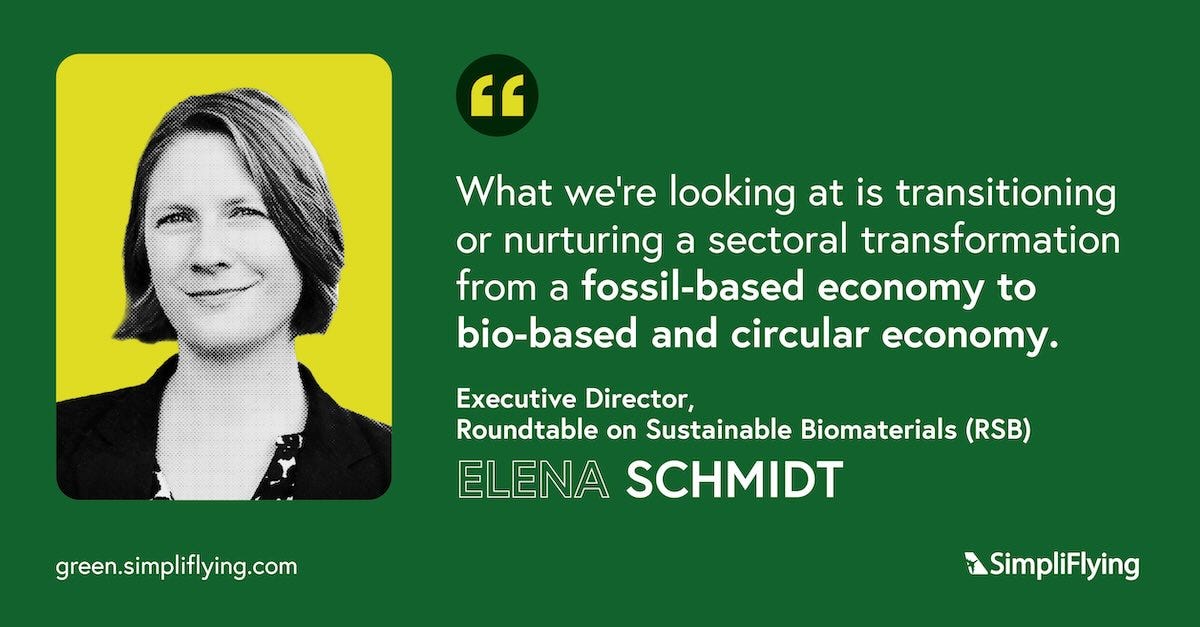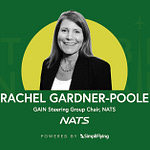In this episode of our ‘Sustainability in the Air’ podcast, Elena Schmidt, Executive Director of the Roundtable on Sustainable Biomaterials (RSB), speaks with SimpliFlying CEO Shashank Nigam about the journey of RSB in fostering sustainability, especially in the aviation and travel industries.
Schmidt joined RSB in 2015 and initially served as the Standards Director. Her extensive experience in sustainability programs and innovation in product and business models stems from her previous position as Head of the TÜV SÜD Certification Body for Climate and Energy. As an auditor, Schmidt developed expertise in auditing complex chains of custody settings and managed numerous projects focused on developing new certification services involving standard setting and strategic business model development with various partners.
Here are the key highlights of the conversation:
Collaborative, global sector transformation (5:29)
RSB’s ‘book and claim’ system (12:58)
Programmes and certification by RSB (17:48 & 26:00)
RSB’s membership model (29:06)
RSB’s landscape approach to sector transformations (34:00)
Rapid Fire! (39:28)
Keep reading for a quick overview of the episode.
Why RSB’s certification matters
RSB’s globally recognised sustainability certification ensures that products and processes meet the highest benchmarks of environmental, social, and economic sustainability.
The underlying multi-stakeholder model which includes a diverse range of actors — aviation industry players, civil society, and academia — is pivotal in establishing this robust standard. RSB’s certification helps companies and organisations demonstrate their commitment to sustainable practices and fosters consumer trust.
RSB’s inclusive approach to sustainability also plays a pivotal role in the aviation industry’s transition away from fossil fuels. RSB’s strategy involves fostering a shift to sustainable bio-based and circular economies by embracing a wide spectrum of sustainable aviation fuels (SAF), including non-bio-based sources like power-to-x fuels through an efficient book-and-claim system.
5 Takeaways from RSB’s approach to sustainability
1. RSB’s Collaborative and Innovative Framework
RSB brings together a diverse array of stakeholders, including airlines, shipping companies, industrial companies, consumer brands, NGOs, and academia. This collaborative framework allows RSB to create comprehensive sustainability standards, fostering innovation, particularly in the development of SAF, and also sustainable marine fuels and biomaterials. These standards are crucial in guiding industries towards tangible solutions for reducing carbon emissions.
“What we do at RSB, together with our partners, is we develop solutions that help guide the way to a bio-circular economy, and that can serve as a decision-making framework.”
2. Addressing the Complexities in Aviation Decarbonisation
Schmidt acknowledges the challenges in transitioning aviation away from fossil fuels. RSB’s innovative strategies, like the RSB Book & Claim System, are instrumental in bridging the gap between SAF supply and demand. This system, crucial for reducing aviation emissions, demonstrates RSB’s commitment to developing practical solutions for complex environmental challenges. RSB has also put forth a comprehensive manual that details the functioning of the book-and-claim system.
“... book and claim is a crucial tool, bringing together supply and demand in a situation where we still see very, very limited locations globally with SAF availability.”
3. Ensuring robust certification standards
RSB ensures a robust certification standard by engaging its diverse membership through specialised working groups and member platforms.
RSB’s unique governance system comprises over 140 member organisations grouped into 5 distinct chambers — each representing a specific stakeholder type. This structure, which includes producers, industrial end users, NGOs, and academia, culminates in a General Assembly, RSB’s highest decision-making body for standard setting. This comprehensive and participatory approach upholds the credibility and practicality of RSB’s standards and reinforces their trustworthiness.
“...through our [working groups and member] platforms, we engage our members and this is how we can continuously have a dialogue with them and keep our finger on the pulse of what is happening.”
4. Impactful Partnerships
In 2021, RSB launched a SAF book-and-claim pilot with Air bp to enable certified SAF claims for Microsoft and United Airlines. This project, together with other pilots, was foundational in establishing the RSB Book & Claim Manual and the RSB Book & Claim Registry for the broader aviation market use.
In a book-and-claim system, SAF produced and blended at one location can reduce GHG emissions from flights elsewhere. This detaches the environmental benefit of SAF from the actual physical product and allows it to be transferred to a different location.
The impact of SAF is, therefore, more accessible since flights world over can attain the benefits, regardless of regional SAF availability. The RSB Book & Claim System ensures that there is no double counting and that the GHG emission reduction has been verified through a recognised standard.
To pilot the requirements of the RSB Book & Claim Manual, RSB has also worked with several partners in the aviation sector, including Airbus, Etihad, JetBlue, the Sustainable Aviation Buyer’s Alliance (SABA), Singapore Airlines, TotalEnergies and World Energy. In addition, several rounds of stakeholder consultations were also conducted, wherein experts from NGOs and scientific think tanks made insightful contributions.
RSB is also working on a Book & Claim Recognition Framework to establish a common best practice amidst the growing market of independent SAF registries. Based on RSB’s Book & Claim manual, this will establish a credible framework and promote greater acceptance.
“…trust is the most important currency for book and claim that we have to build, that we have to maintain. And we see with the proliferation of different book and claim initiatives, there is a risk that trust might be lost because it may get confusing for industry partners, but also for consumers.”
5. Vision and Strategic Expansion
Looking into the future, RSB aims to complement its individual operator and supply chain certification by facilitating broad, collaborative changes across sectors and landscapes. The RSB analyses and models sustainable feedstock potential in emerging regions to better understand the potential of a sustainable future.
Decarbonising aviation sustainably in Southeast Asia is a project led by RSB, in partnership with Boeing and Standard Chartered, to identify the most sustainable ways in which Southeast Asia can become a global leader in SAF production and use. A similar project is also planned by the RSB in India.
“10 years ago, RSB was focused pretty much on certification and on individual operators’ assessment for their ESG reporting or sustainability compliance. Now, we are moving into making change happen in collaboration with our many stakeholders on a landscape scale. And this is what we want to continue to develop over the next 10 years.”
‘Sustainability in the Air’ is the world’s leading podcast dedicated to sustainable aviation. Through in-depth conversations with top aviation leaders, we break through the clutter and provide a clear roadmap for a net-zero future.













